Archives
now browsing by author
Tribal Member Elizabeth Reeve Competes in Todays American Woman

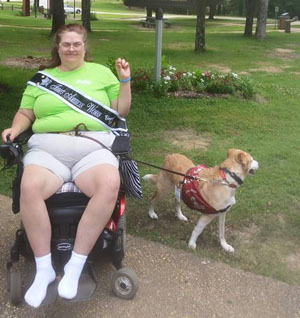
Elizabeth Reeve, a Delaware tribal citizen, recently competed in the Todays American Woman National Elegant Mrs. division, and won the national title. Along with the winning of her division, Elizabeth Reeve also won the Spirit of Pageantry (meaning she gave of herself even when it meant she might have to sacrifice some of her own goals to help other pageant contestants), Presidential Gold Community Service Award (she had well over 500 hours of volunteer time), and the Todays American Woman Community Service Award (she wrote an essay on community service and showed how she had performed the service, and had the top community service book over all of the other contestants). This year, Elizabeth is expected to continue on with the community service in order to try and get the Lifetime service award. The Lifetime service award consists of getting a certain amount of points for different activities. Such as promoting the pageant, getting sponsorships, making appearances, recruitment of delegates, and public relations.
The demographics of Todays American Woman pageant contestants could be any and every woman in America. TAW celebrates the diversity that makes America unique. We are a pageant for ALL women…REAL women….making a REAL IMPACT! Our age divisions range from Junior Teen, Miss, Ms., Mrs., Elite and Golden contestants. We have special divisions for Curvy & Petite ladies too! The Pageant is open to all eligible applicants, welcoming newcomers to join and see how wonderful pageantry can be!
Elizabeth is currently working on her EdD in Organizational Leadership at Grand Canyon University, and is almost done with the exception of her dissertation. She has a Masters Degree in Special Education, and two bachelor degrees (her Bachelors of Business degree was obtained at Northeastern State University). Elizabeth is active in Oklahoma City, with the inclusion of being on the Governor›s State Independent Living Council. Her platform is to help individual look at the abilities they have rather than the disabilities. She was recently in the Oklahoma City Memorial 5K and many other 5Ks, although she did them from her wheelchair. She has been an advocate for service dogs, and helping individuals find their independence. Elizabeth works at Oklahoma City Community College, as an English as a Second Language professor.
To find out more information about this pageant please go to www.todaysamericanwoman.com.
Elizabeth Reeve
Ms. Abilities America National Coordinator and Founder
Ms. Service Dog Angel Lifetime Queen
Elegant Mrs.
Essay Winner: Charles Journeycake: The Faithful Chief
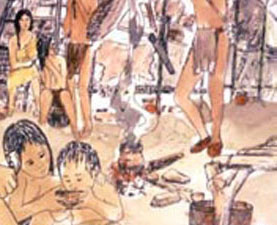
by Emily Messimore
THE DELAWARE INDIAN NEWS ANNOUNCES GRAND PRIZE WINNER
Congratulations to Emily Messimore on being the grand prize winner in the essay contest for our youth. Her essay is reprinted here.
Charles Joumeycake (Neshapanacumin) was born December 16, 1817 to Sally Williams and Delaware Chief Solomon Journeycake in Sandusky, Ohio. In 1828 the Delawares were ordered by the government to move to reservations in Kansas Territory.
After arriving in Kansas Territory, Chief Joumeycake’s mother, Sally, became a Delaware interpreter for missionaries and helped establish the first Indian Mission in Kansas. Inspired by his dedicated Christian mother, Journeycake was saved and baptized in 1833. It is thought that Journeycake was the first person to be baptized in the state of Kansas. In 1833, Charles Journeycake and his mother, Sally Williams, were the only Christians among the Delaware tribe.
In 1855, Charles Journeycake became Chief of the Wolf Clan. By 1861, Journeycake became the principal Chief of the Delaware tribe. In 1867 the Delaware people were once again removed from their homes, this time to Indian Territory, and deemed citizens of Cherokee Nation. It was at this time that Journeycake retired his title as chief, becoming the last official chief of Delaware Nation. Times were hard for the Delaware people in their new home. However, Journeycake’s faith did not waiver. He knew he had a greater purpose that was yet to be fulfilled. Chief Journeycake still cared deeply about the wellbeing and future of his tribe. Acting as chief counselor to the people, he represented the Delaware in Washington D.C. on twenty-four different occasions to fight for legal rights and economic opportunities.
This upright and loving man is largely attributed with the spread of Christianity in the Delaware tribe and in all of Indian Territory. Charles Journeycake was a disciple sent into the violent and desolate land of lndian Territory, who breathed hope into the people there. Shortly after the move to Indian Territory, Chief Journeycake organized a Church in his home. On September 23, 1872, Charles Journeycake was ordained as a minister, at the age of fifty-five, and the Delaware Baptist Church was officially founded. Seven of the eleven founding members were Journeycake’s close relatives. During Reverend Journeycake’s time preaching, the recorded members of the Delaware Baptist Church increased from eleven to nearly three hundred. Reverend Journeycake preached in several Native American languages, including Delaware, Shawnee, Wyandotte, Seneca, and Ottawa. With Journeycake’s encouragement, the Delaware Baptist Association was organized November 27, 1891. Over the course of his life, Journeycake translated the four Gospels of the Bible into the Delaware language.
Journeycake had married Jane Sosha at the age of twenty. They had ten children, eight daughters and two sons. All of their daughters became fervent Christians and worked within the Delaware Baptist Association. One of Chief Journeycake’s daughters married Mr. Bartles, the man whom Bartlesville, Oklahoma was named after.
Journeycake led his family the same way he led his tribe, with a caring dedication. Journeycake had an array of interests and accomplishments. He is credited with establishing the first trading post and post office in his hometown of Alluwe, Oklahoma.
Alluwe is actually a Delaware word that means “A better place.” Later in his life, Chief Journeycake contributed much of his time and money to the development of Bacone College in Muskogee. Chief Journeycake was an intelligent man who enjoyed reading and kept a large library in his home. However, his favorite pastimes were hunting and preaching. After his wife’s death in 1893, Journeycake found little enjoyment except in hunting and working at the Delaware Baptist Church. Charles Journeycake died on January 3, 1894. He was buried beside his loving wife in a cemetery south of Nowata. The graves were later relocated to Armstrong Cemetery in Alluwe due to the building of the Oologah dam.
Journeycake was an advocate of his people and his faith. Above all, he had a vision of what key part of history the Delaware people should hold fast to. He best summed this up in his speech before the Indian Defense Association in 1886. He said, “We have been broken up and moved six times. We have been despoiled of our property.
We thought when we moved across the Missouri River, and had paid for our homes in Kansas we were safe. But in few years the white man wanted our country. We had made good farms, built comfortable houses and’ big barns. We had schools for our children and churches where we listened to the same Gospel the white man listened to. We had a great many cattle and horses. The white man came into our country from Missouri and drove our cattle and horses away across the river. If our people followed them they got killed.
We try to forget these things, but we would not forget that the white man brought us the blessed Gospel of Christ, the Christian’s hope. This more than pays for all we have suffered.”
Sources Cited
Self, Burl. “Journeycake, Charles.” Encyclopedia of Oklahoma History and Culture, 2009. Web. 29 August 2015.
Claremore Museum of History. “Remembering: Delaware Chief, Charles Journeycake.” MoreClaremore, 16 December 2013. Web. 29 August 2015.
Lawson, Russell. “Charles Journeycake and Indian University.” The Baconian, II March 2015. Web. 30 August 2015.
Tatum, Lawrie. “Our Red Brothers and the Peace Policy of Ulysses S. Grant.” Google Books, ND. Web. 30 August 2015.
Notice of General Council, Saturday, November 7, 2015

SPECIAL NOTICE TO TRIBAL MEMBERS
General Council Meeting: Saturday November 7, 2015
This year the annual General Meeting will be held Saturday, November 7, 2015 at the Delaware Community Center, 5100 Tuxedo Blvd. in Bartlesville, OK. Doors will open at 11:30 AM and lunch will be provided at noon. The business meeting will start at 1:00 PM. The State of the Tribe address and staff department reports will be given. Following the meeting Lenape stomp and traditional dances are planned. Please attend !!!!!
Delawares Head to Delaware Water Gap National Recreation Area
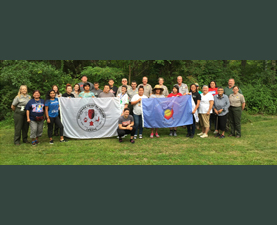
» NEWSPAPER STORY–Teens walk in ancestors footsteps at Delaware Water Gap National Recreation Area
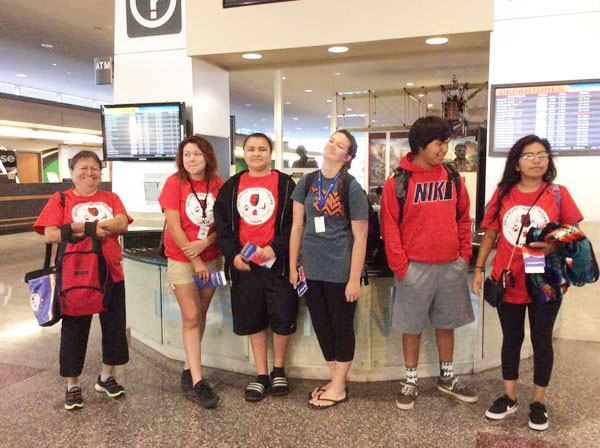 |
| Great group of Delaware youth headed out to the Delaware Water Gap National Recreation Area with their fearless Leader, Cece Runnels. (l-r) Cece, Hopie Thicknail, Kamren Pisachubbe, Kayla Provence, ShuDay Johnson Biggoose, Tiana Long. |
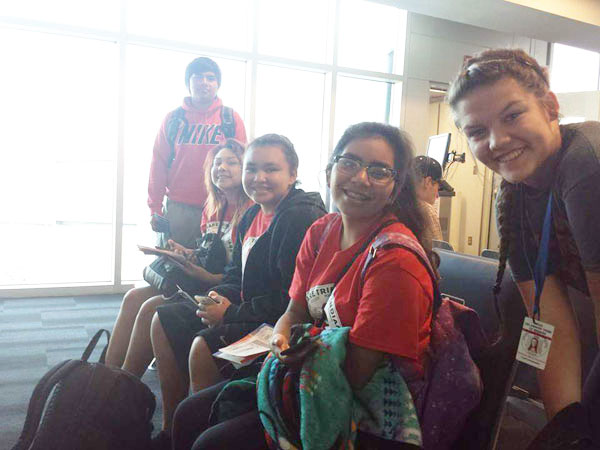 |
Elder Nutrition Director
Delaware Tribe of Indians
Employment Opportunity
Elder Nutrition Director
General Description:
Provide direction and oversight to the department in order to best serve the nutritional needs of the elders utilizing the service. Supervise a staff of 3 to provide daily noon meal and activities to 50 elders. Collaborate with area agencies to develop & disseminate resource guide of elder support services. Manage federally-funded program and submit periodic reports to tribal management and federal agencies.
Qualifications:
Familiarity with U.S. DHHS/ACL, Title VI Part A&C operation and management. Must have or qualify for state food handler’s license. Demonstrate basic understanding of special dietary needs diets of the elderly, Ability to use Microsoft Office Suite programs. Ability to write public outreach information for written and electronic publication.
Please email resumes to mtaylor@delawaretribe.org or fax to 918-337-6591 or mail to 5100 Tuxedo Blvd, Bartlesville OK 74006, with subject line of Elder Nutrition Director. Applications and complete Job Description can be found on this page. No phone calls please, Position closes on July 31, 2015.
Delaware Tribal/Native American preference will be observed.
Congratuations to Recent Graduates
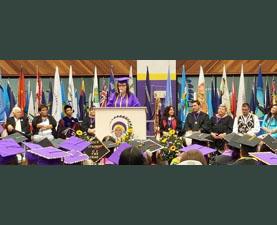
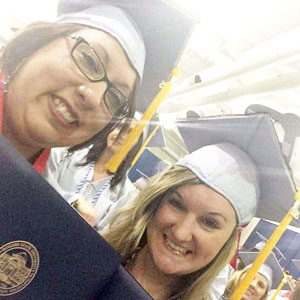 |
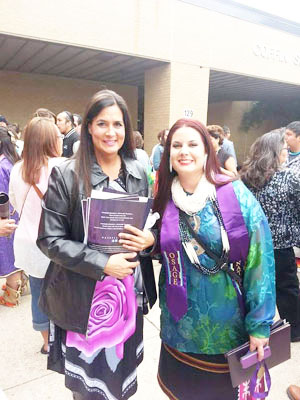 |
| Delaware member, Crystal Thaxton-Dombrovsky, on left. Graduating with a Nursing degree. | Maggie Gray is from our neighboring Osage Nation. Congrats on Graduating from Haskell!!! Pictured with her mother Jennifer here. |
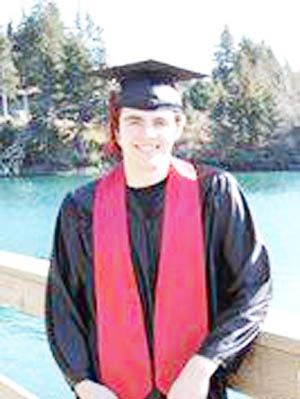 |
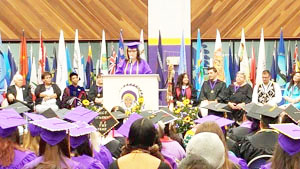 |
| Chance Haller, Valedictorian, Susan B. English School in Seldovia Alaska. | Congrats Delaware member Lori Hasselman, who received her AA in Media Communications at Haskell. She was also awarded Haskell Student of the Year! |
 |
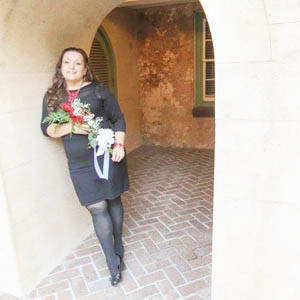 |
| Andrew Dean Humphrey 2015 Graduate of Oologah High School. | Member Myckie Jacobsen graduated from the College of Charleston with a BA in Biology with a minor in Environmental Studies. |
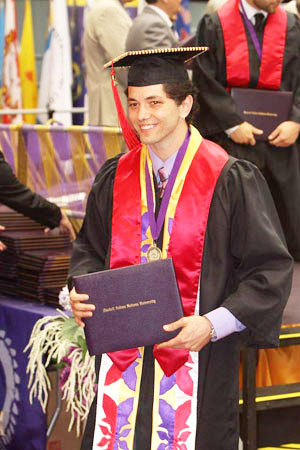 |
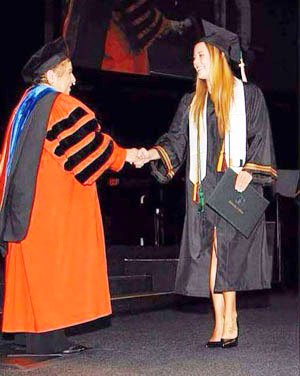 |
| One of our Delawares, Native Studies grad at Haskell. Congrats Bear Tompkins. | Congrats Delaware member Amy Jay Wiley graduates from the University of Miami with a degree of Bachelor of Science in Education with a major in Exercise Physiology and minor in Chemistry. Receiving her degree from President Donna Shalala. |
Lenapeowsi Foundation
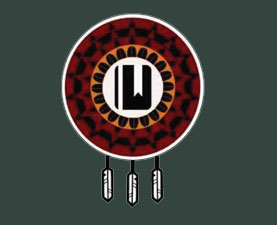

“Lenapeowsi” means to live the Lenape way. The Foundation is a 501(c)3 organization with a mission to preserve, sustain, and perpetuate Lenape language, culture and society. The organization was founded by three Delaware members: John Sumpter, Titus Frenchman, and Nicky Michael. Today, this organization mainly focusses on youth activities. Each year the foundation holds a Christmas Party attended by nearly one hundred people. The Foundation provides Christmas presents to all the children who attend the party. Moreover, each Thursday evening since 2007, the Foundation holds a pot luck and cultural activity as well as language instruction at the Delaware Community Center in Bartlesville, OK. Levi Randoll (Delaware) and Jason Jones (Euchee) volunteer their time and effort to provide this Thursday night activity. Nancy Sumpter and Kay Anderson, both Delaware Elders, attend and provide for the weekly activities. They assure everyone is fed, clothed, and behaved appropriately as most Grandmothers do.
All children are welcome to attend our activities regardless of tribal affiliation. While we focus on Lenape culture, we include other Tribes as well. For instance, some of the kids know how to sing in both Kiowa and Lenape. Cherokee culture is also strongly influential in our area. Last week, the youth attended a stomp dance at the Miami Tribe complex.
The Cherokee Nation, Native Voices Rising, and the Delaware Tribe have all supported the organization with both cash grants and in-kind donations. Our youth also sell t-shirts, wrist bands, and fans to raise money for their field trips and dance attire. If you would like to donate to this organization or purchase items, please call the Chairwoman, Nicky Kay Michael, PhD at (918)766-6299, or submit a check to Lenapeowsi Foundation, 927 E. Portland Ave. Dewey, OK 74029.
The Delaware People’s Historical Presence in Pennsylvania

by Catherine Monck
THE DELAWARE INDIAN NEWS ANNOUNCES SECOND ESSAY WINNER
Congratulations to Catherine Monck, tribal member from Lexington, Kentucky on being our second winner in the essay contest for our youth. A $100 gift will be in the mail very soon to Catherine, and all other youth who sent in essays will be receiving $25 checks. Her essay is reprinted here.
Many people begin the history of the Delaware people around the same time the white settlers arrived in North America. The Delaware people were settled in the area that is now made up of the states of Delaware, New York, New Jersey, and Pennsylvania. They were considered to be one of the two most powerful Native American groups in North America. They lived in longhouses covered in grass and bark. Their language was Algonquin with three different dialects which were Munsee, Unami, and Unalactigo.
In the year 1610, Captain Samuel Argyll went into the area in which the Delaware people lived. He decided to name the area and the people that lived there “Delaware” in honor of his commanding officer, Sir Thomas West III Lord De La Warr, who was also the Provincial Governor of Virginia. This begins the unfortunate decline of the Delaware people. The white settlers were not respectable or understanding of the lifestyle that the Delawares had.
As more white settlers moved into the Delaware area, things began to change for the worse. The Delaware people had never been exposed to the idea of people owning land. They had always believed that “the Creator” owned all of the land, and they simply inhabited it. Yet, the white settlers had different ideas. In the beginning, the white settlers seemed to be relatively fair in their interactions with the Delawares in terms of land transactions. Then, the colonial government began to push for even more settlements and even more expansion. When the Delawares left their villages to go hunting or fishing, the land was viewed as abandoned and consequently taken. This is where many conflicts arose, and then became violent.
The once semi-fair economy began to spiral out of control as the white settlers gained more control. Soon the Delawares were running out of land in the original area to occupy. The colonial government consistently continued to push for more expansion. All of this led to more and more tensions and more clashes.
The last straw for the Delawares and the colonists was the 1737 Walking Purchase. A well-thought-out fraud from the beginning, the Walking Purchase was meant to determine how much land the Penn family (the family who helped settle Pennsylvania) would purchase. The agreement had been created while Thomas Penn was still the patriarch, and was then carried out by William Penn, who was Thomas’ son. The original idea was that the amount of land would be how far a man could walk in a day and a half. Each group of people had three men who would “walk” for them. The white settlers cheated though, training their men how to run for miles for many hours, cutting away underbrush along the way, having horses available to carry their supplies, and even boats to get them across rivers. When the Delawares protested the clearly unfair agreement, the Iroquois were called in. The Iroquois were happy to be involved in the finalization of the agreement, because they felt they had defeated the Delawares in the 17th century, and were pleased to have a title to the land.
After the 1737 Walking Purchase, the Delaware people slowly got pushed out and down south in the United States. The Native Americans and the white settlers could not coexist, and the white settlers had the power. The Delaware people slowly moved down, until many of them settled into what is now modern-day Oklahoma. Many of the living descendants of the Delawares live in Oklahoma and the surrounding areas.
The Delaware people had a difficult time in Pennsylvania. They were oppressed and abused. They were tricked and used by the white settlers. It is unfortunate that they were driven out of their land that they respected and held so dearly. Yet, despite all of these hardships, they still continue to live on and thrive. The culture is still in existence, and that is incredibly respectable.
Sources Cited
- http://www.easterndelawarenations.org/history.html
- http://delawarein.webs.com/delawarehistory.htm
- http://www.tolatsga.org/dela.html
INSPIRE Pre-college Native American Political Leadership Scholarship Awarded

Joey Richard, son of Steven and Ann (Tipton) Richard of Glen Carbon, Illinois, has received a scholarship to the INSPIRE pre-college Native American Political Leadership Program at George Washington University, located in Washington D.C., this summer. INSPIRE scholarships are awarded to students based on evidence of academic ability, leadership potential, and an interest in public service.
The INSPIRE Pre-College Program is a full scholarship open to Native American, Alaska Native, and Native Hawaiian rising junior and senior high school students, who apply and are selected to spend three weeks on the GWU campus learning about intergovernmental relations between tribal governments and the federal government. As a scholar at GWU, Joey will study the process and practice of democratic representation in the U.S., focusing on the interplay between tribal interests and politics and government at the national level. He will closely study how national politics in the electoral and legislative arenas work.
INSPIRE students live on campus and participate in recreational programs with the community of high school students enrolled in GWU Pre-College programs. INSPIRE is funded by a grant from AT&T Foundation.
The INSPIRE application was recently highlighted in the Delaware Indian News January 2015 issue and it was instrumental in Joey’s decision to apply.
Joey is a junior at Father McGivney Catholic High School, Maryville, Illinois. Joey carries a 3.92 GPA and is active in National Honor Society, student leadership, scholar bowl, math team, academic committee, yearbook, soccer, and band. He teaches kindergarten Sunday School and is an active member of the music ministry at St. Mary’s church in Edwardsville, Illinois. Joey worked as an intern on a recent political campaign. Joey is interested in pursuing a business or international relations degree in college and a possibly a law degree.
Joey is the grandson of the late Alice and Virgil E. (Son) Tipton Jr., Springfield, Illinois, great grandson of Lida W. (Woodall) and Virgil E. Tipton Sr., Afton, Oklahoma and is proudly descended from the Woodall, Marker, and Killbuck lines.
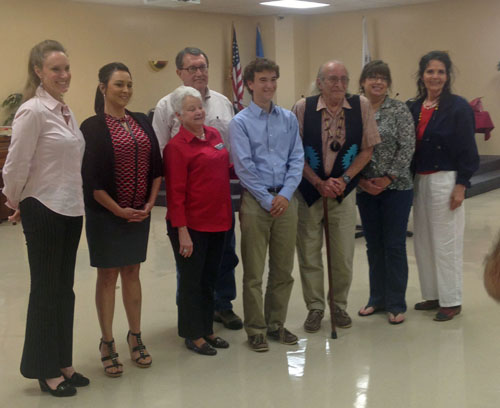 |

 D5 Creation
D5 Creation